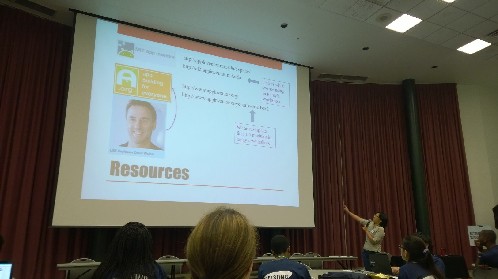Students from Underserved Communities Learn STEM Subjects at 4-H Samsung Summer Science Program

| John Critelli
Staff at Rutgers University gave underserved high school students an academic boost at the 4-H Samsung Summer Science Program the week of July 7, 2014.
The weeklong program was designed to give students from financially disadvantaged communities exposure to STEM (science, technology, engineering and math) subjects. Participants from Essex, Union, Passaic, Mercer and Middlesex Counties were able to interact with scientific experts and experience a taste of college life.
Interactive lectures and hands-on learning took place at the Busch, Cook/Douglass, and Livingston campuses. The program was organized by Rutgers University and 4-H staff members and was sponsored by Samsung, which calls Ridgefield Park, N.J it’s North American headquarters’ home.
The intensive program featured dozens of events; students had the opportunity to tour science labs, enjoy one-on-one discussions with scientists and pursue multiple hands-on projects.
Projects focused on robot building, mobile app development, exercise physiology and biotechnology, among several other topics. The wide variety of subjects was intended to give students exposure to new career possibilities while allowing them to pursue subjects they were already passionate about.
Passion was an important factor, as students had to complete a rigorous process to be considered for the program. Applicants were required to fill out an application, provide transcripts, complete an essay and attend an in-person interview to enter the selection process. Sixty-three students were chosen in total, 15 of whom returned from previous years.
One student, Ziare Bellamy of Mercer County, participated for his third time. Bellamy, who said he who was already passionate about science and math, recalled being excited for his first year at the Summer Science Program. “Knowing that I was going to do something that involved science and math, I was already excited about it,” he said.
The program, which started six years ago, was developed by Chad Ripberger, project director of SET (science, education and technology) in Urban Communities for 4-H’s New Jersey presence and Janice McDonnell, the 4-H science agent in the Department of Youth Development at Rutgers University. Rutgers is home to the New Jersey headquarters of 4-H, and most of the participating experts are affiliated with the university.
Christine Hung, an electrical engineer and computer scientist, is one such expert. Hung, who taught an app-building workshop at the summer program, said educating adolescents about STEM fields is very important. “Technology is everywhere,” she said, adding that it’s necessary to have a segment of society that understands such widely used equipment.
Hung, who also teaches at Rutgers’ Governor’s School of Engineering and Technology, is one of many Rutgers-affiliated educators who feel this way.
Participating in the 4-H Samsung Summer Science Program can help professors receive grants and also gives graduate students an opportunity to build their resumes. But “most of them do it because they want to,” said McDonnell, who recruits educators for the program.
Educating others is also a goal for the participating students.
Students in the Summer Science Program are expected to act as STEM ambassadors, fulfilling 50 hours of community service by educating others in their communities. The program instructs them on effective teaching methods for explaining STEM subjects to people with no prior knowledge.
In addition to gaining exposure to new experiences and educational skills, two attendees returning from previous years were selected to receive $2,500 Samsung STEM College Scholarships, which will allow them to pursue undergraduate degrees in STEM-related fields at the college of their choice.
But the Summer Science Program does not only benefit students – it’s designed to benefit society as a whole.
Abby Gallo, program manager of Corporate Citizenship at Samsung Electronics North America, said educating underserved students gives the world an opportunity to tap into bright minds whose potential might otherwise be overlooked.
The Summer Science Program also allows such students to connect with others and find common ground.
Bellamy said one of the highlights of the program is “meeting people who are interested in the same exact things that you are. You’re just so ecstatic that there’s nothing that you would want any more.”
A video about the program can be found here.

